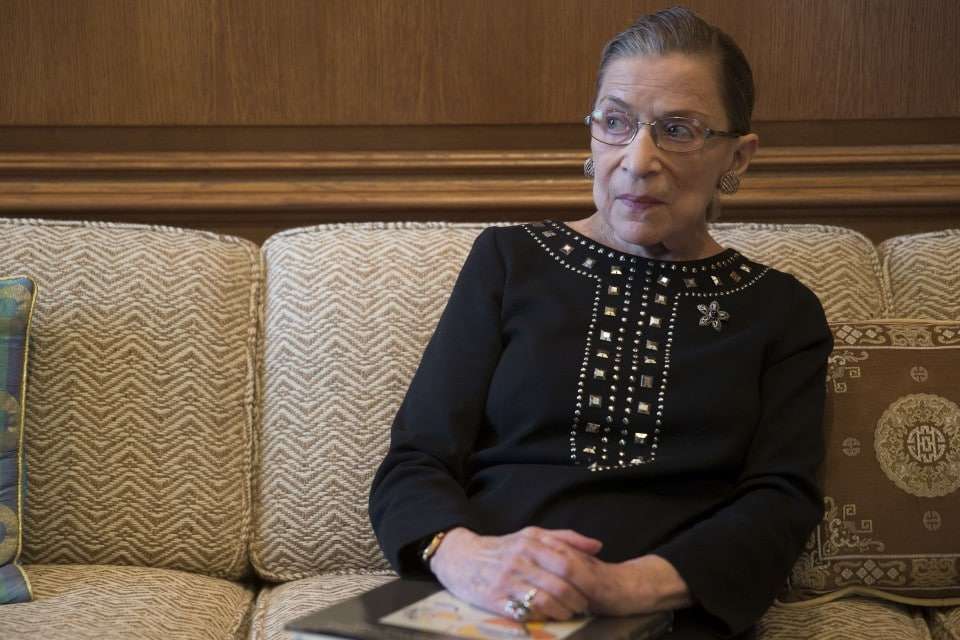The Volokh Conspiracy
Mostly law professors | Sometimes contrarian | Often libertarian | Always independent
Justice Ginsburg fails an important test of judicial ethics

Imagine a prominent federal judge gives a media interview in which the judge disparages a potential litigant. Imagine further that the judge expresses a clear preference for a given practical outcome in potential litigation. Imagine further that these opinions are expressed in strong terms and made repeatedly, over the course of several interviews, and that such comments continue even after the judge receives criticism for the initial remarks. Is there any question that the judge would be obligated to recuse if the anticipated litigation comes to that judge's court? And if that judge failed to recuse, would not that be grounds to criticize the judge's conduct and question that jurist's judgment?
What I have just described is not a hypothetical. It describes the recent conduct of Justice Ruth Bader Ginsburg, a.k.a. the "Notorious RBG."
Over the summer, Ginsburg gave a series of interviews in which she disparaged GOP presidential nominee Donald Trump, noted the likely impact of the election on the court and expressed her dismay at the possibility that Trump could win the election.
Ginburg's comments were highly inappropriate for a sitting judge. After substantial public criticism from both her fans and foes, she expressed regret for her remarks. In a press statement, she acknowledged that "my recent remarks in response to press inquiries were ill-advised and I regret making them." Echoing the code of conduct for federal judges, she noted that "judges should avoid commenting on a candidate for public office." She also pledged to "be more circumspect" going forward (though she would again apologize for public comments in the fall).
It's bad enough that a sitting justice made such remarks. What's worse - far worse - is that Ginsburg appears not to recognize that her comments obligate her to recuse in election litigation in which Trump (or his campaign) is a party.
On Monday, the Supreme Court denied an application from the Ohio Democratic Party to reinstate a district court injunction against potential conduct by the Trump campaign that the Ohio Democratic Party believes might constitute voter intimidation. Not only did Ginsburg participate in rejecting the Ohio Democratic Party's stay application, but also she issued a statement explaining her vote.
So, Ginsburg participated in a case in which she repeatedly disparaged one of the parties and expressed a strong preference for that party's defeat in the very election that was the subject of the case. This was unethical of her to do. She should have recused.
One possible defense of Ginsburg's failure to recuse is that (as far as I am aware) no recusal motion was filed. This is a fair point. Yet there is no question that Ginsburg was aware of the issue. After making her comments, she was subject to substantial criticism (including commentary that noted the recusal obligation she had created) and she acknowledged the inappropriateness of her remarks in her statement expressing regret.
Given these facts, it is hard to imagine that Ginsburg was unaware of the issue when she participated in ODP v. Donald J Trump for President, and had she given the issue a moment's reflection, I would have thought she would have seen the need to take herself off of the case.
Ginsburg's failure in this regard is particularly disappointing because so many people hold public institutions, including the court, in such low regard. Now, more than ever, we need public figures to place principle above politics and to follow their legal duty, even when it's inconvenient.
As regular readers know, I actually share Ginsburg's low opinion of Trump and do not want him to be the next president of the United States. If (God forbid) there were a Bush-v.-Gore-style case before the court, I would hope that Trump would lose. Nonetheless, should such a case arise, I think it is clear that Ginsburg is obligated to recuse, particularly if a recusal motion is filed. But let's hope it does not come to that.


Show Comments (0)